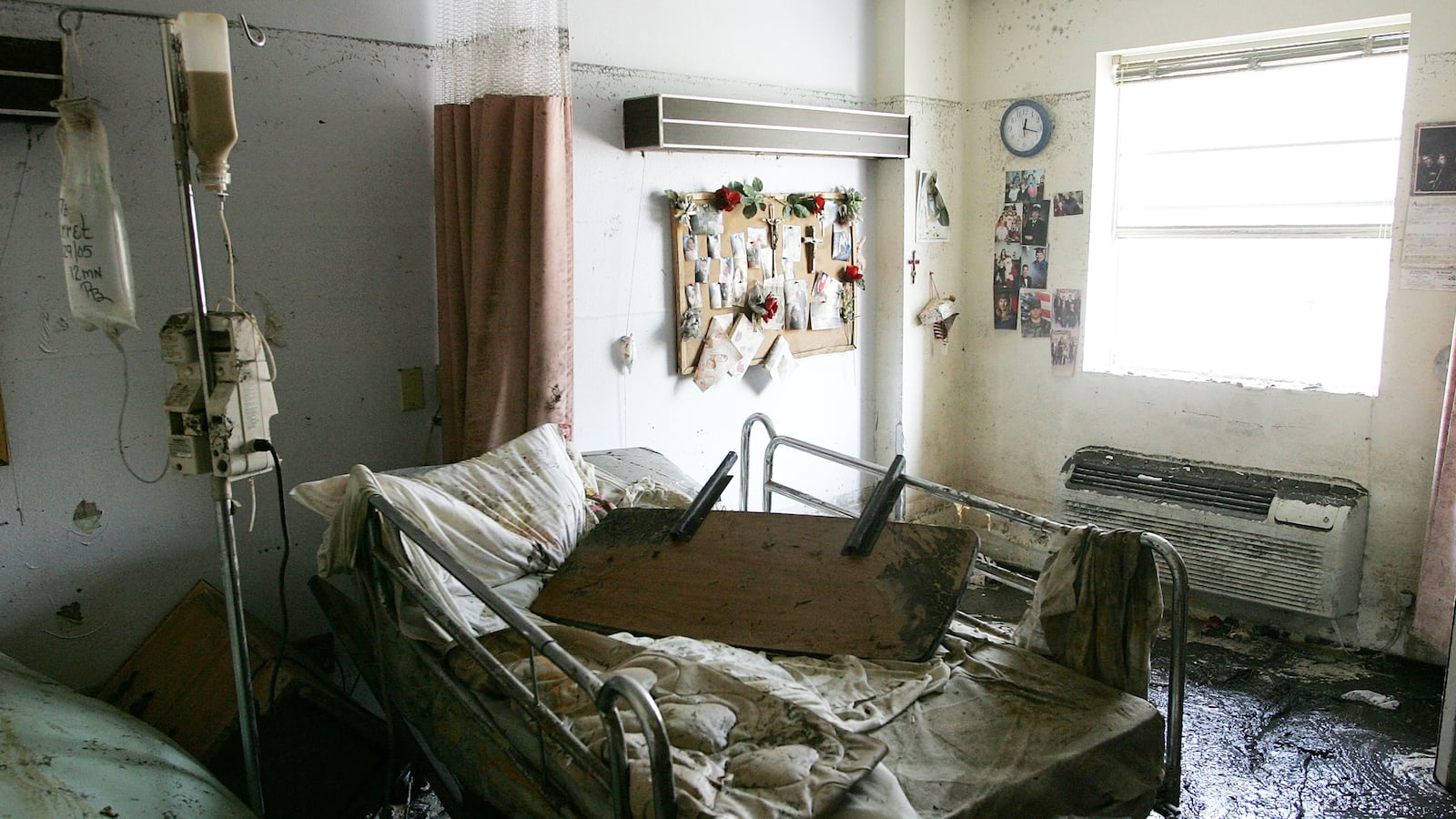When thirty-five old people in a nursing home drowned during the Hurricane Katrina flood, Louisiana officials launched a manhunt for the owners, Sal and Mabel Mangano. Nancy Grace thundered on CNN: “Now I’m hearing that these two owners that made money off all these elderly nursing home citizens were out shopping—shopping! —after all these elderlies died.”

With nearly a million evacuees from the New Orleans area stuck in hotels, homes of friends, relatives, or public shelters, Grace gave volume to an anger of the masses, a spreading hostility stoked by the gross government failure everyone saw on television. People on rooftops, burning in the sun, waited days to be rescued. Now, a manhunt for the owners of a nursing home, just south of the city, was rough cosmic justice come at last.
It took several days for the traumatized Manganos to know the law was on their trail. After rescuing almost as many people as those who drowned, they climbed in exhaustion onto the roof of the nursing home. First responders took them to a shelter in Dallas with not much more than the clothes on their backs.
Jim Cobb, an insurance defense lawyer, fled with his family before the flood wrecked their New Orleans home. He was hunkered down in a Houston hotel, depressed, watching bodies being recovered from St. Rita’s Nursing Home when a call came from a colleague asking if he would take the Manganos’ case.
Wondering if he would ever rebuild his practice, Cobb said yes on impulse. Once into the case, he swore to himself that he would “sue the fork-tongued DisGrace for the false and defamatory venom she [was] spewing.” He never got around to that, though Cobb’s brief on media coverage has a prosecutorial flair.
He negotiated the Manganos’ “surrender” before the court in a surreal scene after news reports that they were trying to leave America.
Flood of Lies is Cobb’s account of how his life changed in defending the Manganos, and his loathing for Attorney General Charles Foti, who engineered the indictment. This is no garden variety legal thriller. Cobb blasts news celebrities, politicians, and various state officials in a quest to find himself.
Cobb does speak kindly about Diane Sawyer of ABC who sensed his 14-year old son’s anguish at being displaced, stuck in a new school, confused by the chaos in his life; she kept in touch with Chris by email and invited the boy and his dad to a backstage visit for one of Jim’s interviews. We find proof in a smiling photograph in the book.
But for all of the media moments, the injustice Cobb saw in the indictment got to him, digging deep to the bone. On a golf course, Cobb shanks a shot and hurls the club in such a rage that a player in the foursome steadies him on the shoulder, saying: “Son, you’ve got to calm down. You’re going to have a heart attack out here and there ain’t nobody gonna go mouth to mouth on you…Try and have some fun.”
Cobb’s kaleidoscopic personality drives the momentum in what amounts to a war story of jurisprudence. In a state with a spectacular history of corruption, politics permeates the legal reality as Cobb devises a combat strategy against the prosecution. His contempt for judges and politicians was so absorbing that I read the book in two sittings.

“The vision of the strategy we would use came to me, margarita in hand, at a cheesy Mexican restaurant in the shopping center next door to our service road apartment” in Houston, discloses Cobb. “I had become something of a regular at happy hour.”
Turns out the bartender was from St. Bernard Parish, where the Manganos had their nursing home. And this guy had a buddy who worked for the levee district. “And all he ever did was go to work, smoke dope, and drive a tractor cutting grass,” confides the man serving Cobb’s third margarita. “Somebody ought to sue all them people”—meaning, the government.
Cobb and the two lawyers he enlisted to assist in the defense managed to subpoena, successfully, Governor Kathleen Blanco and other state officials to testify at trial. The defense turned on the failure of the Army Corps of Engineers, a federal agency, to maintain the levees, and the breakdown of the state’s evacuation planning that wreaked chaos on the Manganos and the people who died or nearly perished in the nursing home flood.
This reverse-the-charges approach—making the trial into a symbolic indictment of state, local and federal government for gross negligence—was one bold crap shoot. The Manganos, however, had received a letter from prosecutor Foti, months after the trial, asking for donations to his reelection campaign—a computer glitch on the mail out, no doubt—yet by Cobb’s lights a reason to ask the judge to disqualify Foti. Cobb, too, had gotten such a letter and his nostrils raced to the scent of blood.
But the judge ruled against the defense in pivotal turns. As these setbacks mount, the trial narrative finds new drama as it moves toward climax. With Cobb’s pugilistic legal tactics high-octane personality for plot fuel, Flood of Lies becomes a book you wish wouldn’t end.






